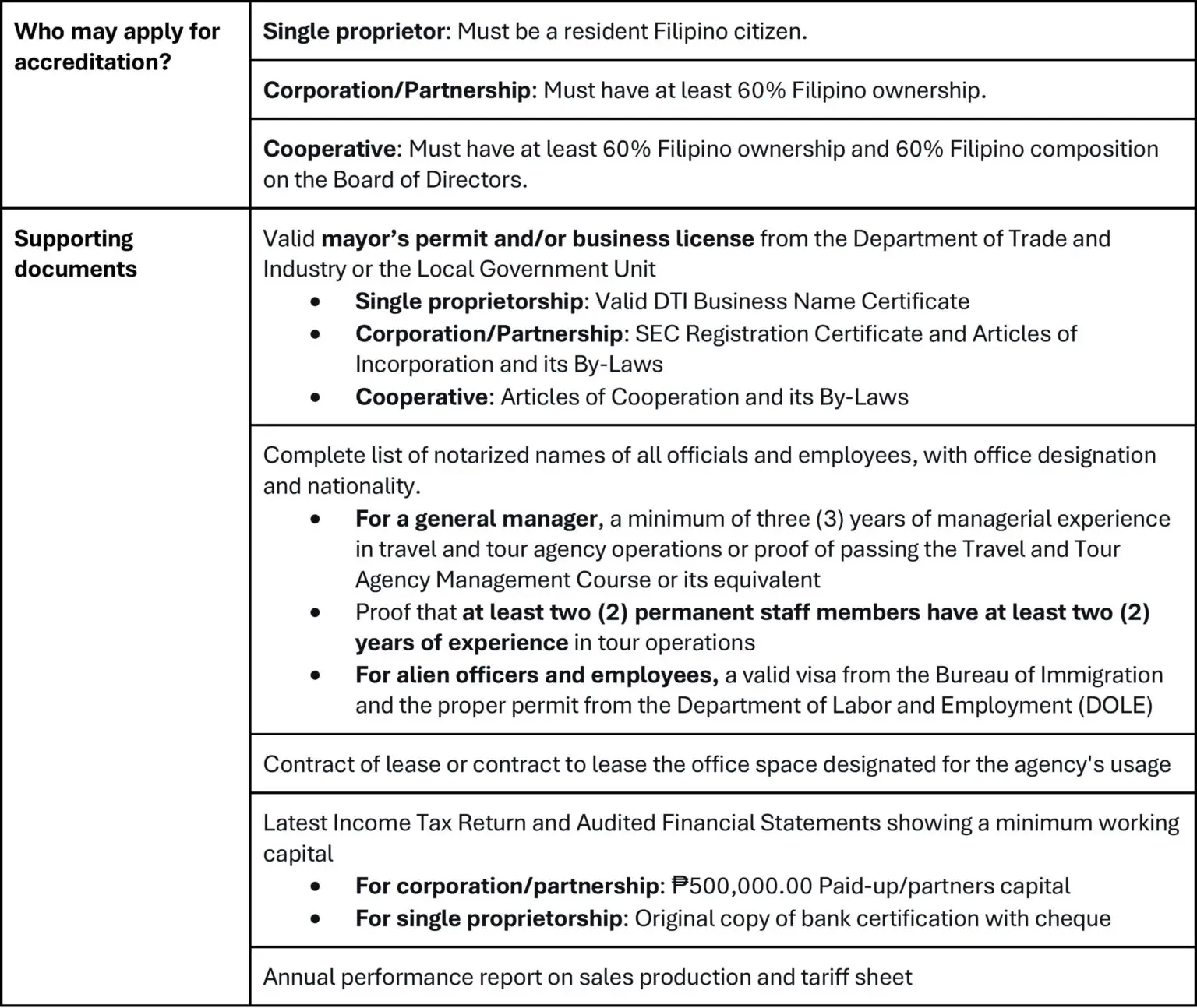Requirements and Costs of Getting a Travel and Tour Agency Franchise
Before you set off on this business venture, map out the requirements and costs involved. Let’s explore the process of acquiring a travel and tour franchise in the Philippines, covering types, requirements, initial investment, and ongoing expenses.
Different Types of Travel and Tour Agencies in the Philippines
- Retail travel agencies assist with creating itineraries, finding deals, arranging transportation and accommodation, handling refunds and cancellations, and managing insurance and travel documents.
- Online travel agencies (OTA) connect buyers with travel products like airfare, lodging, car rentals, and holiday packages with a focus on personalized customer experiences.
- Wholesale travel agencies buy everything in bulk from airlines, hotels, and transportation companies and then sell them to retail travel agencies.
After figuring out the type of franchise you want to set up, you need to provide requirements to get started. Take note that these are for new franchises only.

Starting a travel agency franchise in the Philippines involves expenses depending on factors in your business plan, like location, business size, office setup, staffing, and marketing efforts. Initial costs usually fall between ₱500,000 to ₱1,000,000 or more. Remember to budget for things like licenses, permits, office space, tech needs, and staff training to make this ballpark figure more accurate.
Best Practices for Running a Successful Travel and Tour Agency Franchise in the Philippines
Though lucrative, the industry can be a tough one to navigate. Here are some of the best practices you can do for your growing travel venture.
General tips
- Choose a strategic locationYou want to be noticed by your audience. Opt for a spot with high visibility and accessibility, ideally near terminals and malls.
- Offer competitive prices and packagesYou can stand out amidst the competition by providing value-driven pricing and appealing packages tailored to your customer’s preferences.
- Provide excellent customer serviceEnsure excellent customer service and keep your clients coming back by training your staff to deliver knowledgeable, courteous, and responsive services that build loyalty and enhance your reputation.
- Maintain a good reputationTo get to the top, you need to uphold high standards of integrity and service quality. Address customer feedback and concerns to cultivate and maintain a positive reputation in the industry.
For Attracting and Retaining Customers

- Create a website and social media presenceWith a captivating website and engaging social media presence, you can effectively showcase your services and connect with potential customers through compelling content and meaningful interactions.
- Build a loyal customer baseYour customers are the lifeblood of your franchise. Prioritize customized experiences, attentive service, and ongoing communication for strong customer relationships, loyalty, and repeat business.
- Ask for referrals and testimonialsWord-of-mouth recommendations and testimonials from satisfied customers are invaluable assets for your franchise, amplifying your reach and helping build your credibility to attract more prospects. After all, nothing’s more convincing than a happy customer and five stars.
- Join travel fairs and exposTravel fairs and expos showcase your business and tangibly engage with potential customers. Eye-catching displays, exclusive deals, and interactive activities create a lasting impression on attendees and provide quality leads.
For Managing and Growing the Business
Hire and train qualified staff

Being the face of your franchise, your staff should deliver exceptional customer experiences. Invest in hiring qualified individuals who are knowledgeable, enthusiastic, and customer-oriented.
To supplement their efforts, provide comprehensive training so they can assist customers, handle inquiries, and represent your brand effectively and professionally.
- Keep track of finances and inventoryImplement robust accounting systems and inventory tracking software to manage cash flow, as well as other business growth strategies. Regularly reconcile accounts, track sales performance, and evaluate financial data to pinpoint areas for improvement and optimize profitability.
- Comply with laws and regulationsOperating a travel and tour agency franchise entails adherence to various laws and legislations governing the industry. Assess whether you need to file a PhilGEPS Certificate of Registration. Not only do these keep you in business—preventing financial challenges like fines—but they also boost client trust.
- Seek new opportunities and partnershipsContinuously explore new opportunities and partnerships to expand your franchise’s reach and offerings. Apart from identifying trends within the travel industry, you can benefit from forging strategic partnerships with airlines, hotels, tourism boards, and other industry stakeholders to enhance your product offerings.
For Overcoming Challenges and Risks
- Cope with seasonalityTravel and tour agency franchises experience fluctuations in demand due to seasonal variations in travel preferences. Consider offering specialized packages and promotions tailored to different seasons and target markets. For example, a hot spring package during the cold rainy season or water rafting for the hot summer seasons. You can also try being creative by promoting off-peak destinations or seasonal activities to attract customers year-round.
- Deal with competitionCompetition in the sector can also be a source of inspiration for your innovation and improvement. Differentiate your franchise by emphasizing unique selling points, such as personalized service, exclusive partnerships, or niche offerings, and make sure to stay one step ahead.
- Handle complaints and disputesAdopt a proactive approach to addressing customer complaints by training your staff to pay close attention to what customers have to say, empathize with their concerns, and offer timely resolutions.
- Adapt to shifting customer preferences and market trendsThe travel industry is constantly evolving. Stay agile and responsive by monitoring customer behavior, preferences, and feedback regularly. The ones who listen rise to the top because they know what their customers want and need.
